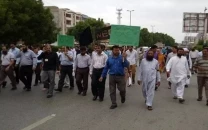Saad Aziz, four others challenge death sentences
Lawyer claims they were tried illegally, without counsel

Saad Aziz was convicted for killing T2F director Sabeen Mahmud, as well as being involved in Safoora Goth bus attack. PHOTO: FACEBOOK
A two-judge bench, headed by Justice Syed Hasan Azhar Rizvi, directed the federal law officer to submit a written reply by July 18.
A military court had awarded capital punishment in the case to Saad Aziz alias Tin Tin, Tahir Hussain Minhas alias Sain, Asadur Rehman alias Malik, Mohammad Azhar Ishrat alias Majid and Hanif Nazir on May 12 last year.
The Islamic State-inspired group of youths had shot dead around 45 members of the Ismaili community in the outskirts of Karachi in May, 2015.
Extremism leading to terrorism
However, the court acquitted three others - former Fishermen Cooperative Society Deputy Director Sultan Qamar Siddiqui, his younger brother Muhammad Hussain Siddiqui, and Naeem Sajid - of charges of facilitating the massacre.
In January this year Aziz, Minhas, Ishrat, Rehman and Nazir had filed appeals against their conviction and sentences awarded to them by the military court.
On Thursday, the deputy attorney-general argued that the Lahore High Court and the Supreme Court had passed judgments in respect to the convictions and sentences awarded to the accused persons by the military courts. However, he failed to submit any written reply on behalf of the federal authorities concerned and requested for time to do the same.
Allowing time till July 18, the bench directed the federal law officer to file comments by the next date of hearing.
'Arms supplier' granted protective bail in Safoora Goth carnage
Case history
The appellants’ lawyer, Hashmat Ali Habib, argued that the appellants were tried before the military court, which was set up in Malir Cantonment under the Army Act, as part of Islamabad's National Action Plan.
The appellants were kept at Karachi's central prison where they were provided an appeal format to be filed before the Registrar Court of Appeals, Judge Advocate-General of the General Headquarters of the Army, said Advocate Habib.
He informed the judges that on August 15 the appellants were informed that their appeals had been rejected on July 25. They moved appeals in the Lahore High Court, which on October 3, 2016 also turned them down on the matter of maintainability since the offence was committed and the trial conducted within the jurisdiction of the SHC.
Advocate Habib argued that the conviction judgment passed by the military court was not maintainable in the eyes of the law as the petitioners should not have been in custody of the military authorities and tried under the Pakistan Army Amendment Act (Act-II of 2015) or the Protection of Pakistan Act, 2014, which now stands expired. Further, the petitioners did not belong to any terrorist organisation or terrorist group using the name of religion or sect or raised arms or wage war against Pakistan as decided by a joint investigation team.
ATC to indict Saad Aziz, Tahir Minhas in five more cases
He contended that the petitioners were illegally tried and that too in the absence of any counsel, which was a violation of Article 10 of the Constitution, as they were also kept incommunicado during their trial and investigation. Thus, their conviction is liable to be set aside, he added.
The lawyer claimed that the petitioners' right to fair trial under Article 10-A has also been violated and that the Supreme Court had also held in one case that an accused cannot be denied meeting with family under Note 7 that was added to Section 73 of the Pakistan Army Act.
The apex court had also remanded back petitions of many convicts who had challenged their conviction by military courts to the relevant high courts over the same concerns, said Habib. Therefore, he pleaded that the court call record and proceedings of the military court trial for its perusal, set aside the petitioners' sentences and acquit them.



















COMMENTS
Comments are moderated and generally will be posted if they are on-topic and not abusive.
For more information, please see our Comments FAQ